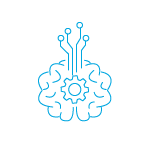Every industry has experienced significant change over the past decade thanks to advancing technology.
Touted for its ability to make us more efficient and productive, new platforms and AI-based software are revolutionising how we work, play, learn, shop, pay for goods and services, and more.
Still believed to be in their infancy, artificial intelligence (AI) and machine learning (ML) are at the pointy end of advancing technology – set to disrupt all sectors in the near future…and health is certainly no exception.
COVID-19 proved how quickly situations (and the tools we use to manage them) can change, with an increasing number of hospitals turning to technology to ease the burden.
Remote patient monitoring grew exponentially as patients were equipped with thermometers and pulse oximeters to self-monitor at home and report readings.
In the coming years, we’re likely to see this morph into more sophisticated at-home diagnostics and monitoring that leverage the latest in AI and ML to reduce pressure on patients, doctors, and specialists.
However, there are other use cases for AI and ML in the health space that are already saving medical and allied health practice owners time and money, while improving patient outcomes.
For practice owners wishing to stay ahead of the curve, investigating these use cases now could make all the difference between surviving a tech-driven future, or thriving in one.
What do AI and ML look like in practice now?
Imagine equipping every doctor with a “virtual nurse” that records patient notes in real-time so doctors can focus exclusively on examining and engaging with their patients.
These notes are then cross-referenced against a database of potential conditions, with the virtual nurse serving up a list of recommended tests or next steps.
At the end of the appointment, the patient is also spared the hassle of standing in line at reception as an integrated billing system seamlessly manages the process.
These advanced tools are already being used by some medical practices; integrated with other AI-driven software that is designed to reduce much of the administrative burden associated with daily operations.
When it comes to diagnosis and forward planning for patient care, one of the ultimate potential benefits of AI and ML is the ability to analyse big data and find trends that humans may miss, or simply don’t have the time to sift through.
AI and ML are already being used to evaluate large amounts of data from heart monitoring systems, CT scans, MRIs, and more, to provide an extra safety net in case doctors miss something – or to draw from extensive publicly available and global diagnosis data for more detailed assessment.
In the medical practice, consolidating your health care data and tapping into broad databases of other medical data can give your doctors an edge when analysing patient test results, discussing the impact of treatments, or developing long-term health plans.
From the patient perspective, this comprehensive and proactive response to their medical concerns not only builds trust – it shifts their perception beyond the standard 15-minute consult for a prescription and towards better overall health outcomes.
How RSM can help
Technology should be viewed as an enabler of human capability – not a replacement for it.
While a medical chatbot can answer patient questions at any time of the day or night, it’s never going to be a substitute for a real conversation with a qualified professional about health and wellbeing.
But the future is coming faster than we think, and forward-thinking is essential.
It can be difficult to know where to start when investigating the potential for AI in your business and the impact on your bottom line, so it’s worthwhile engaging with a trusted third party to assist.
Our specialist National Health team comprises a unique cohort of financial experts, business advisers, and digital specialists who can collaborate to help you determine the best way to move forward to minimise cost and maximise ROI.
We can help you get to the bottom of any pain points you are experiencing, and evaluate how new systems could streamline operations, support doctors, improve patient care, and position you as a practice of the future.
For more information
For a confidential discussion, contact Peter Nicol (National Director, Medical) on (02) 6057 3000, or contact your local RSM office.





